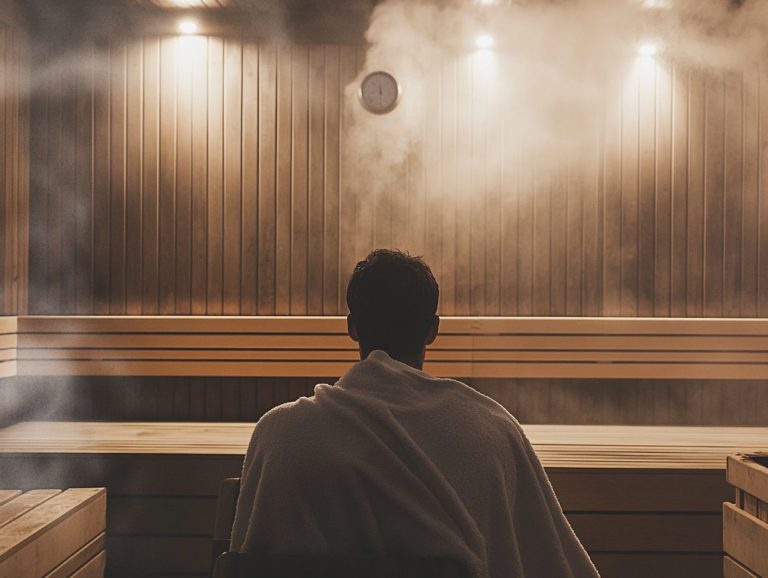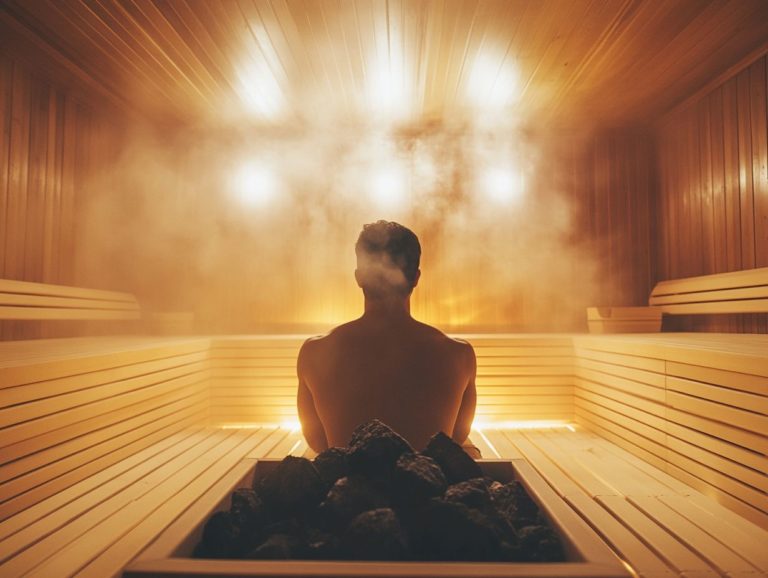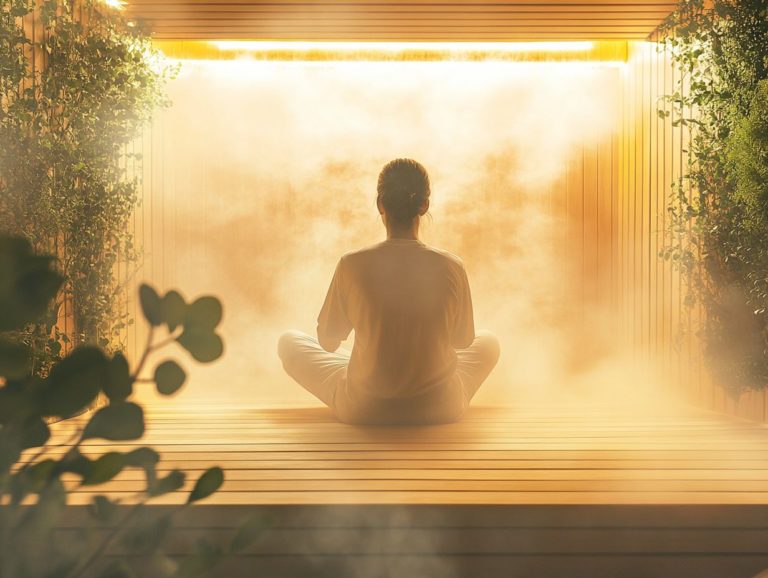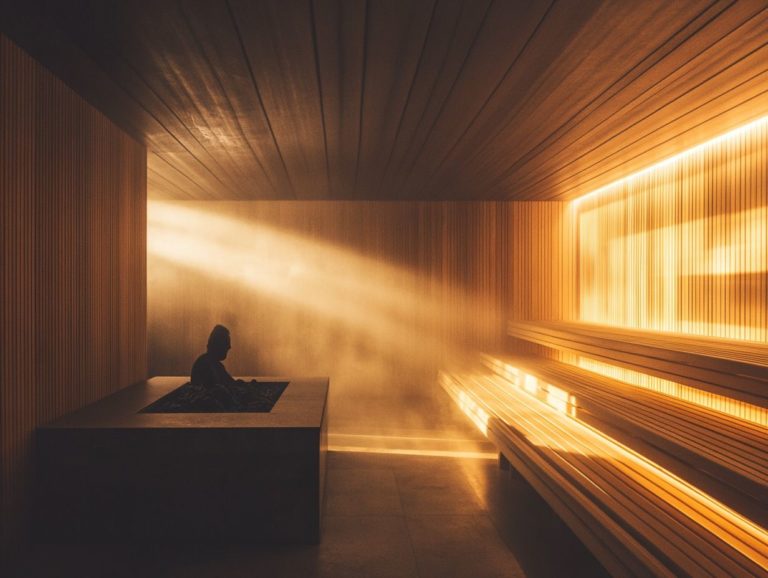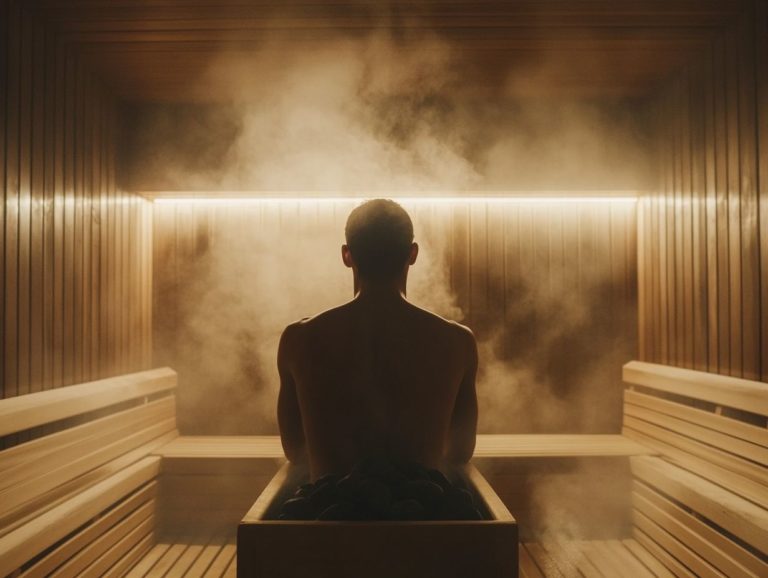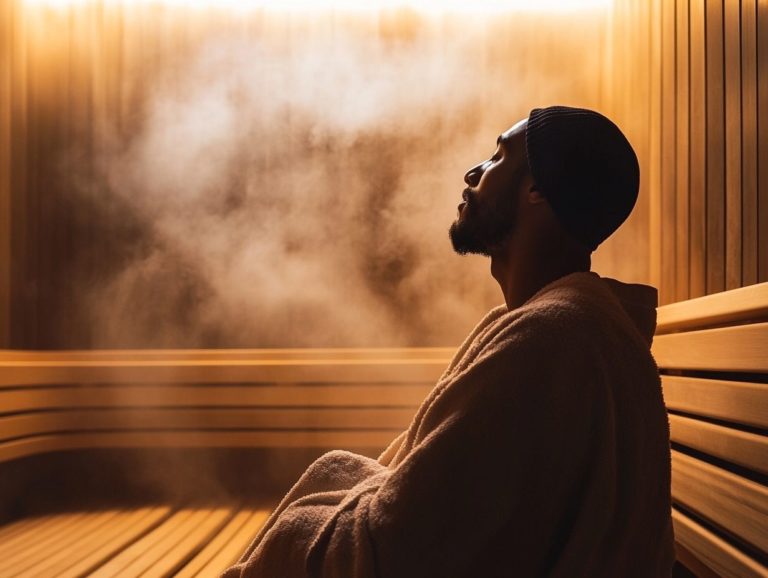Are There Age Restrictions for Sauna Use?
Saunas have long been revered for their comforting warmth and multiple health benefits, positioning them as an ideal choice for relaxation and rejuvenation.
Before you immerse yourself in this steamy haven, it’s crucial to grasp the fundamentals of sauna use. Familiarize yourself with what saunas are, the advantages they bring to your physical and mental well-being, and any age restrictions that may come into play.
This exploration will cover potential dangers for various age groups and provide you with insightful tips for practicing sauna safety, ensuring that you can fully enjoy this timeless tradition without a hitch.
Contents
- Key Takeaways:
- Understanding Saunas
- Benefits of Sauna Use
- Age Restrictions for Sauna Use
- Potential Risks for Young and Old Users
- Safe Sauna Practices for All Ages
- Frequently Asked Questions
- What are the age restrictions for sauna use, and how can parents supervise their children in this setting?
- Are there any potential risks for children using saunas?
- Is it safe for pregnant women to use saunas?
- Are there any age restrictions for using saunas in public facilities?
- Can children use saunas with parental supervision?
- Is there a recommended age for children to start using saunas?
Key Takeaways:
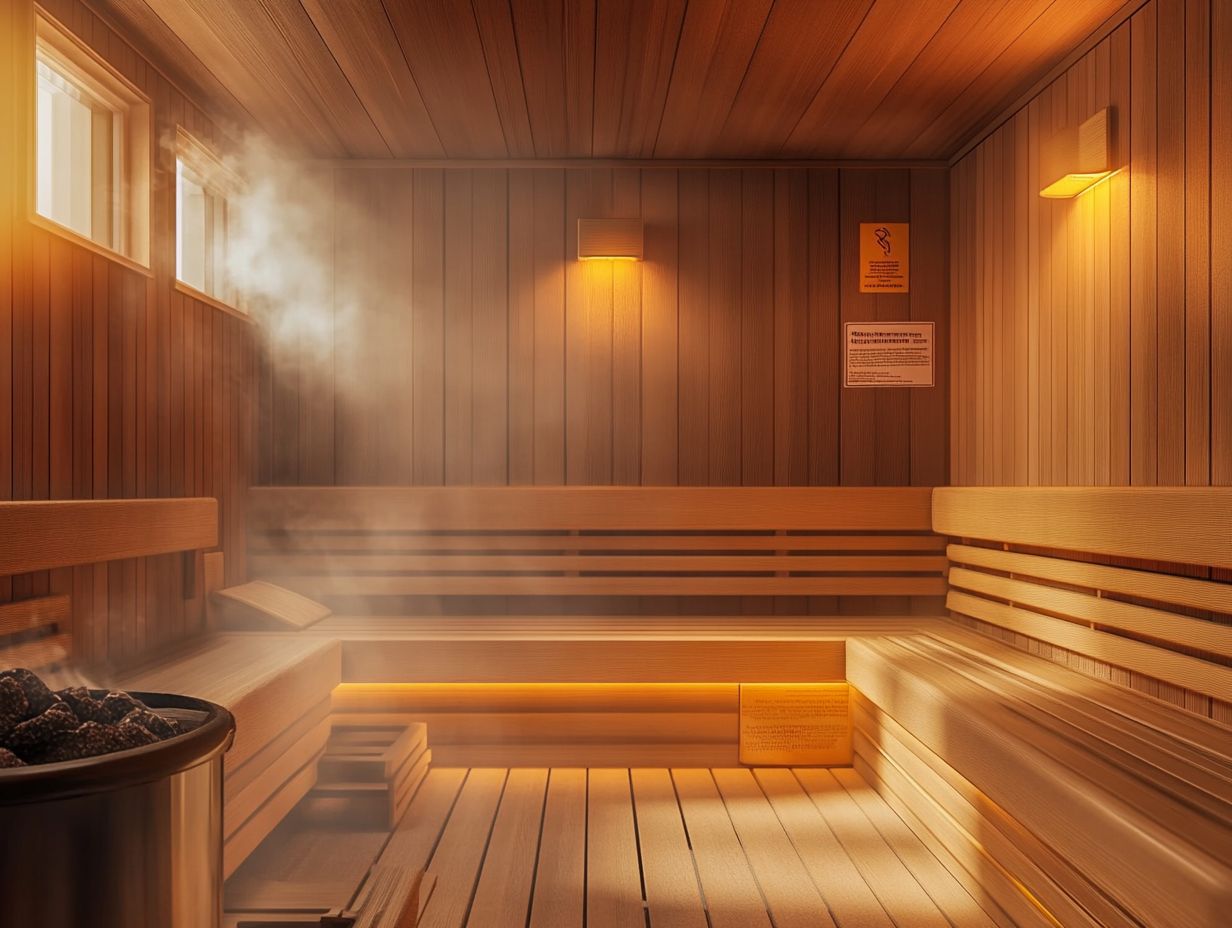
- Children and elderly individuals should consult with a doctor before using a sauna due to potential health risks.
- The recommended minimum age for sauna use is typically 12-18 years old, while the maximum age may vary depending on individual health and tolerance levels.
- Safe sauna practices, such as staying hydrated and limiting time spent in the sauna, can ensure a positive experience for people of all ages.
Understanding Saunas
Saunas carry a deep cultural importance, especially in Finland, where they are woven into daily life and communal well-being. These heated rooms are more than just retreats; they are sanctuaries for relaxation, detoxification, and social connection, enjoyed by both adults and children alike.
It’s important to explore the different types of saunas, such as traditional wood-burning and modern infrared varieties. Understanding the appropriate temperatures and durations for safe usage ensures that your sauna experience is enjoyable and free from potential dangers.
Experts recommend adhering to proper sauna practices to maximize the health benefits and overall enjoyment of this cherished tradition.
What is a Sauna?
A sauna is your personal oasis for relaxation and wellness, often crafted from wood and featuring stone heaters that produce steam by pouring water over heated rocks. Meanwhile, modern infrared saunas utilize infrared heaters that warm your body without heating the air to the same extent.
These heated spaces offer a range of therapeutic benefits, enhancing circulation and promoting detoxification as you sweat it out. You’ll primarily encounter two types of saunas: the traditional steam sauna, which operates between 150 F to 195 F, and the infrared sauna, typically ranging from 120 F to 140 F.
While traditional saunas envelop you in hot, humid air for that all-encompassing warmth, infrared saunas delve deeper into your skin, providing a more intense yet less oppressive heat experience. This distinction affects your comfort and aligns with your health goals, as each type presents unique advantages for relaxation and muscle recovery.
Benefits of Sauna Use
Get ready to feel amazing with improved circulation and enhanced muscle recovery! Regular sauna sessions also provide a delightful boost to your mental health through relaxation and stress reduction, benefiting both adults and children.
The soothing heat encourages sweating, which aids in detoxification and potentially elevates your cardiovascular health by increasing your heart rate and blood flow much like light exercise. This ritual enhances your overall well-being and can also serve as a wonderful social activity, fostering connections and enriching your mental health even further.
Don’t miss out on the incredible benefits of sauna sessions! Try one for yourself and discover how it can transform your relaxation experience.
Physical and Mental Health Benefits
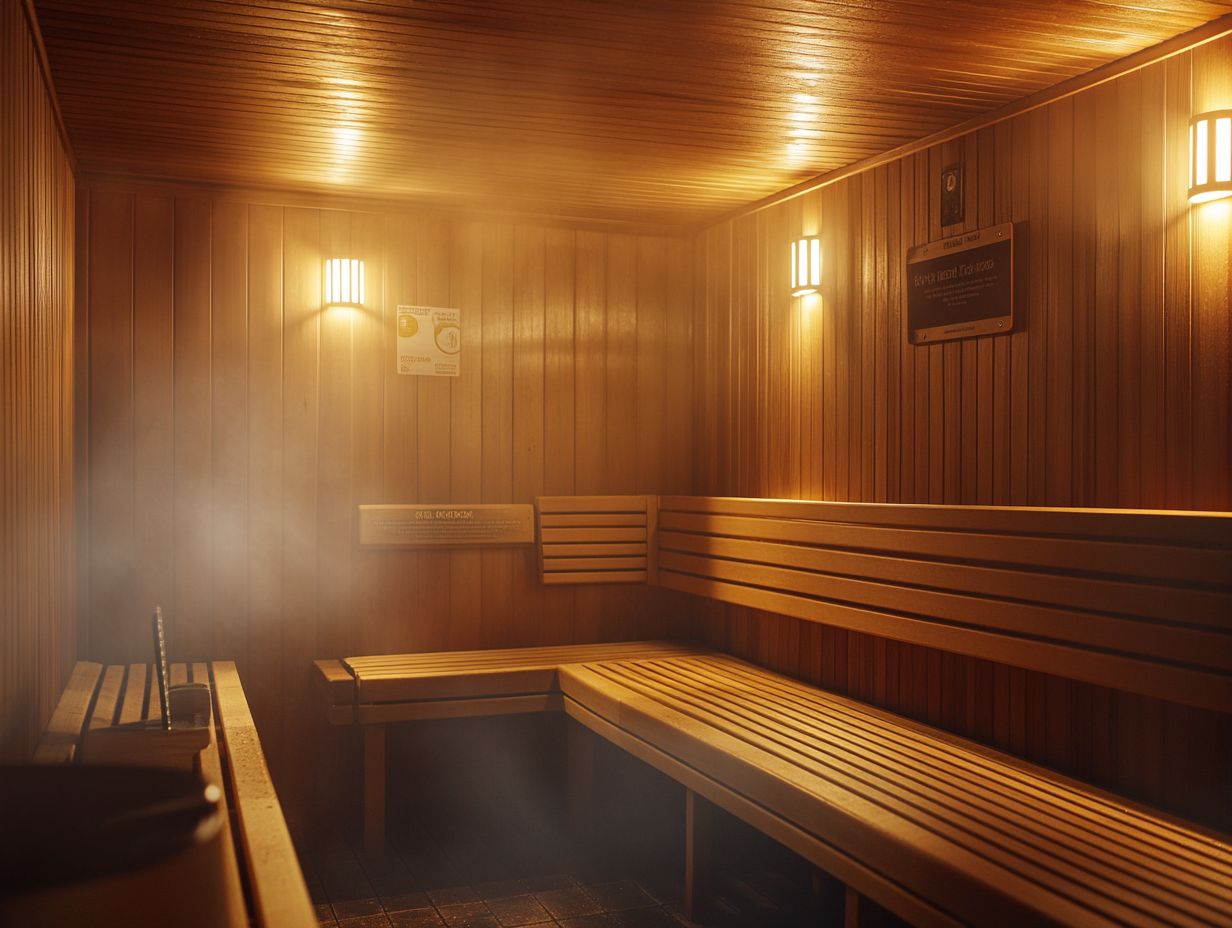
The physical and mental health benefits of sauna use are impressive and well-documented. You can enjoy improved cardiovascular health as your heart rate increases and circulation enhances. This significantly reduces the risks of heart disease and hypertension.
Regular sauna sessions can also help alleviate stress and anxiety, promoting mental clarity and relaxation. That refreshing cooldown isn t just for show; it can help reduce dizziness and invigorate you.
Research shows that frequent sauna sessions may lower blood pressure and enhance how well your blood vessels work, perfectly aligning with findings from the Journal of Human Hypertension. Experts emphasize the potential for sauna use to boost your mental wellbeing as well. The heat stimulates the release of endorphins, leaving you with feelings of euphoria and an uplifted mood.
Sweating helps your body get rid of toxins and heavy metals, improving overall health. With such a diverse array of benefits, sauna bathing becomes a compelling addition to any health regimen aimed at enhancing both physical and mental resilience.
Age Restrictions for Sauna Use
When using a sauna, it s essential to understand the age restrictions to prioritize safety and health especially for children, who often have different heat tolerances compared to adults.
Make sure kids under 6 don t use saunas alone always supervise! Children may be more susceptible to overheating or dizziness. Parents should consider individual health conditions and consult a doctor if there are any concerns about their children s safety in saunas.
Recommended Age Limits
Experts generally advise keeping children under the age of 6 away from sauna sessions. For older kids, participation is acceptable but should always be under strict supervision. Limit their time to no more than 10-15 minutes to prevent overheating and ensure their safety.
For older children, closely monitor their comfort levels and encourage them to stay hydrated to avoid dehydration during and after their sauna experience. Adults can usually indulge in longer sessions, typically ranging from 15 to 30 minutes, depending on personal tolerance and health conditions.
It s wise for everyone to take breaks, allowing for adequate cooling down time between sessions. Maintain a suitable temperature ideally around 150-195 F. Always consult with a healthcare professional before using the sauna, especially if there are chronic health issues. This can significantly enhance safety and enjoyment.
Potential Risks for Young and Old Users
While saunas offer a wealth of health benefits, it’s important to recognize the potential risks, especially for children and the elderly, who may have differing tolerances to heat and hydration levels.
Children are more susceptible to dizziness or overheating, so strict supervision and safe practices are crucial. Older adults might encounter risks stemming from pre-existing health conditions. Always consult with a doctor before allowing your child to use a sauna it’s crucial for their safety!
Prioritizing safety ensures you can fully enjoy the therapeutic advantages saunas have to offer.
Health Concerns to Consider
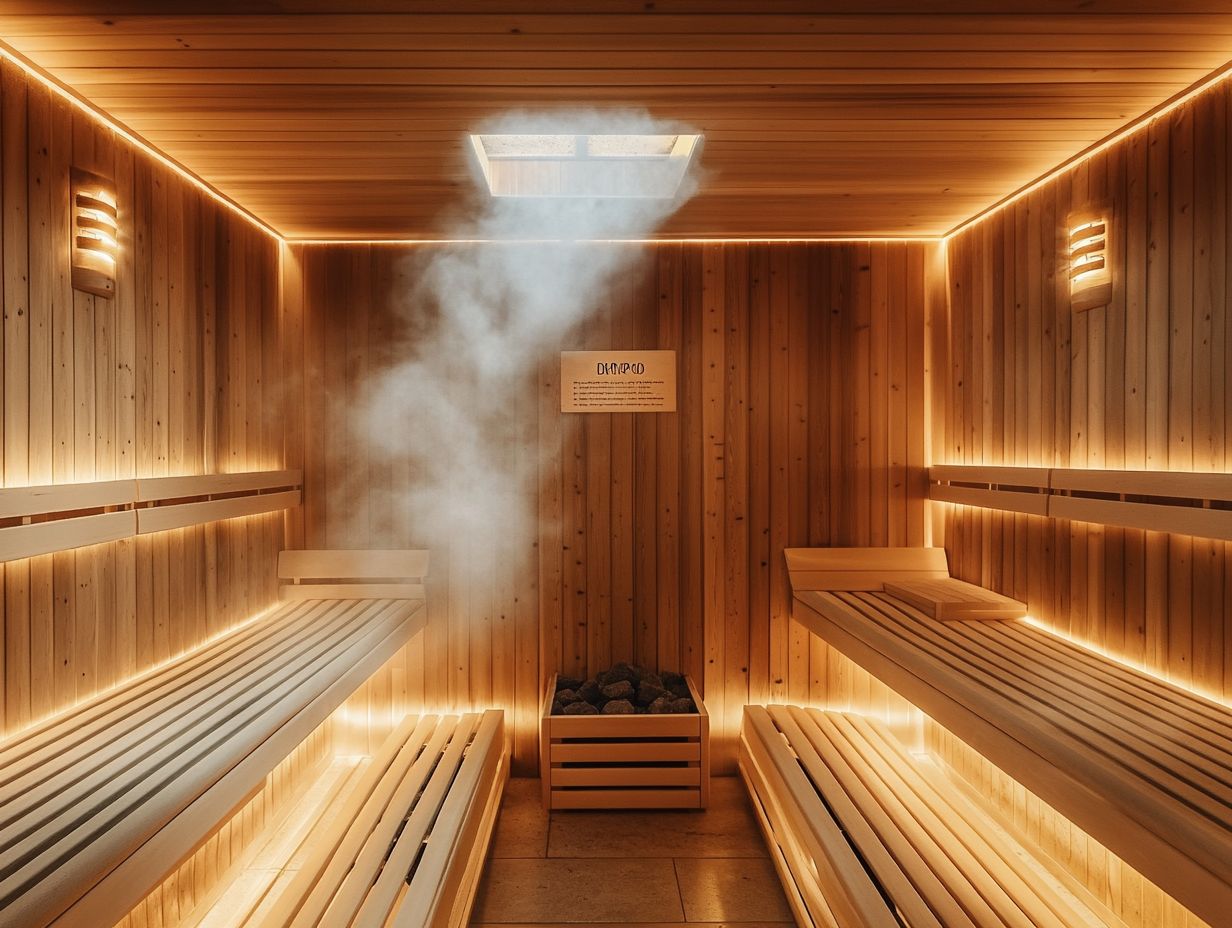
When considering sauna use, it s essential to address specific health concerns, especially the risks of dizziness, dehydration, and overheating. These issues can easily arise if you don t listen to your body s signals during your sessions.
Understanding how extreme heat affects your body is crucial. You might feel lightheaded or even faint shortly after stepping out of the sauna, particularly if you haven t properly hydrated beforehand. Hydration is key to sauna safety, as your body can lose fluids quickly through sweating. Be mindful of existing health issues, as they can increase risks.
Therefore, keeping an eye on how long you spend in the sauna and ensuring you drink enough fluids before and after is vital for a safe and enjoyable experience.
Safe Sauna Practices for All Ages
To ensure a safe and enjoyable sauna experience for everyone, following best practices makes sauna time safer and more enjoyable! This includes providing proper supervision for children, maintaining adequate hydration, and carefully regulating the time spent inside the sauna to prevent excessive heat exposure.
By following these guidelines, you create a welcome environment that everyone can appreciate.
Tips for Safe and Enjoyable Sauna Use
To fully embrace the health benefits and ensure an enjoyable sauna experience, it s essential for you to drink plenty of water before and after your sessions. Limiting your exposure time to around 15-20 minutes is also advisable, along with taking cool showers afterward to help regulate your body temperature.
Listening to your body throughout the experience is crucial. If you start to feel any discomfort, don t hesitate to take a break or step out of the sauna. Allowing yourself a cool-down period afterward will help your body transition back to its normal state. It s also wise to avoid heavy meals or alcohol beforehand, as these can lead to discomfort or dehydration.
Always consult with a healthcare professional before starting sauna sessions, especially if you have any existing health issues. By adhering to these safety practices, you re setting the stage for a reassuring and effective sauna experience that enhances your well-being.
Frequently Asked Questions
What are the age restrictions for sauna use, and how can parents supervise their children in this setting?
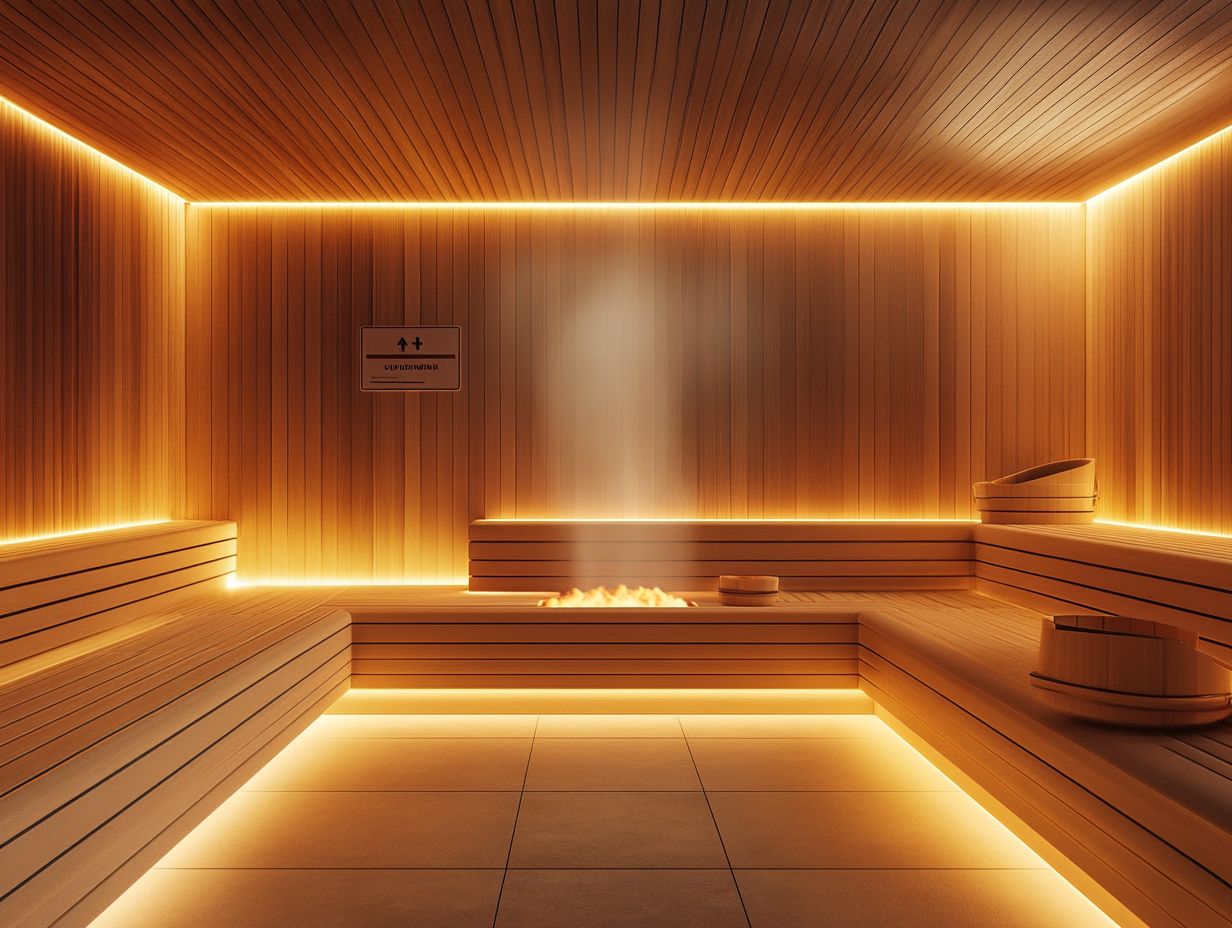
There are no universal age restrictions for sauna use. However, it is recommended that children under the age of 12 do not use saunas due to their lower tolerance for heat.
Are there any potential risks for children using saunas?
Yes, there is a risk of dehydration or heat exhaustion for children using saunas. It is important to monitor their time and make sure they are well hydrated.
Is it safe for pregnant women to use saunas?
Pregnant women should avoid using saunas, especially during the first trimester, due to the potential risk of overheating. It is always best to consult with a doctor before using a sauna while pregnant.
Are there any age restrictions for using saunas in public facilities?
Some public saunas may have age restrictions, typically for safety reasons. It is best to check with the specific facility for their policies on age restrictions.
Can children use saunas with parental supervision?
While parental supervision is important, it is still not recommended for children under 12 to use saunas. Parents should also be aware of the potential risks and keep a close eye on their child’s well-being in the sauna.
Is there a recommended age for children to start using saunas?
There is no specific age recommended for children to start using saunas. It is best to wait until they are physically developed and have a better understanding of their body’s response to heat before introducing them to saunas.

